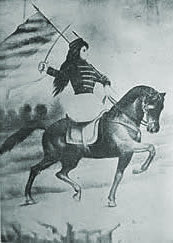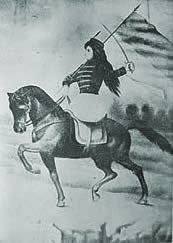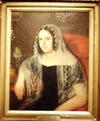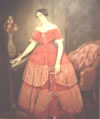
|
Women and Independence in Latin America An exploration of women's involvement in the Latin American Wars of Independence |

|

|
Women and Independence in Latin America An exploration of women's involvement in the Latin American Wars of Independence |

|
Click on one of the images below to see the full-size image
 Manuela Rosas |
 Manuelita Rosas |
 Manuelita Rosas |
 Traje de verano |
Gender:Female
Ethnic origen: Unknown
Events:
| 1817 | - | Buenos Aires | - | Not applicable | - | She was born in Buenos Aires on 24 May 1817. |
| 1852 | - | London | - | Unknown | - | She married Máximo Terrero and moved to London around this time. |
| 1898 | - | London | - | Unknown | - | She died in London, on 17 September 1898. |
Connections:
Female relatives of past and future leading political/military/ cultural figuresBiography:
The daughter Juan Manuel de Rosas, she was born in 1817. She became his confidant after her mother’s death in 1838. She accompanied her father in public life. He delayed her marriage until she was aged 34. Her character is portrayed as of "wax" - soft and pliable - as opposed to her parents who had "iron wills". She nonetheless had a happy marriage to Máximo Terrero. (Knaster, 516.)
She is also portrayed as having an "Angel of Mercy" facade that was her father's way of using her as a political intermediary, in both national and international affairs. (Knaster, 519.)
Ibergueren quotes José Mármol: "No es una mujer bella, propiamente hablando; pero su fisonomía es agradable y simpática, con ese sello indefinible, pero eloquente que estampa sobre el rostro la inteligencia cuando sus facultades están en acción continua. " The death of her mother on 19 October 1838 brought Manuela into public life as Rosas believed a woman beside him was essential for his political action. He wanted someone beside him in whom he had absolute confidence who would ward off complaints against him and to prevent betrayals. (Iberguren, 60-63.)
Basadre claims she is remembered for her goodness; she put "la dulzura de su presencia al lado de excesos de la Tiranía". (Basadre, 337)
After her mother died she accompanied her father on political occasions, her sympathy and kindness were a great asset. She had a circle of family and friends around her who shared her official duties. Sometimes she tried to soften her father's decisions, such as the case of Maza and Camila O'Gorman, but without success. Her relationship with Máximo Terrero lasted for many years as Rosas would not consent to their marriage, but they did marry after Rosas fell from power. She had two sons, born in 1856 and 1858. They lived in London, and visited her father in exile. She died in London on 17 September 1898 without having returned to Argentina. (Sosa de Newton, 552)
References:
Romero de Valle, Emilia (editor). (1948) Mujeres de América
Basadre, Jorge (1929) La Iniciación de la República
Knaster, Meri (1977) Women in Spanish America: An Annotated Bibliography from Pre-Conquest to Contemporary Times
Sosa de Newton, Lily (1986) Diccionario biográfico de mujeres argentinas